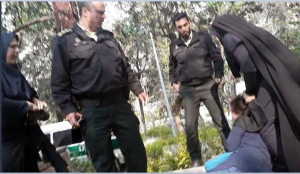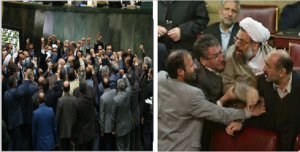(Video) The Return of Iran's Morality Police: A Sign of a Weakening Regime
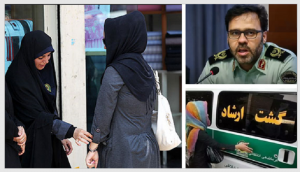
According to the state media, State Security Force commander Mohammad Saeed Montazer al-Mahdi announced on July 16: “The police are dealing with those who break the norm with car and pedestrian patrols across the country on July 16".
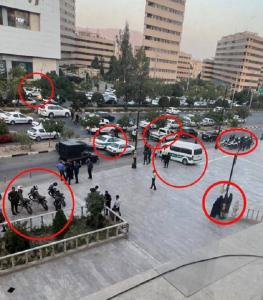
The official announcement of the start of the criminal patrols known as Ershad (guidance), also known as the “morality police” is while in the last few days, videos have been published on social and state media showing arrests and threats against women.
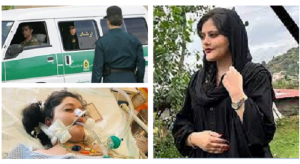
After the oppressive murder of Mahsa Amini on September 16, 2022, which sparked the latest round of uprisings, the morality police did not appear in the streets for a long time, because the dictatorship of mullahs cannot survive without repression.
This struggle is now rising again over the establishment of the "morality police". Some officials are happy with it and others warn of the consequences.
He added: “This action follows the emphasis of the president and the judiciary.” (Mehr News Agency, July 16)
The official announcement of the start of the criminal patrols known as Ershad (guidance), also known as the “morality police” is while in the last few days, videos have been published on social and state media showing arrests and threats against women and issuing inhumane and contemptible sentences against those arrested. One of these hateful sentences is washing corpses for a month in the cemetery in Tehran.
After the oppressive murder of Mahsa Amini on September 16, 2022, which sparked the latest round of nationwide uprisings, the morality police did not appear in the streets for a long time, but the regime’s repression continued against our women and girls in various forms, because the dictatorship of the mullahs cannot survive a day without repression, especially repression directed at women and girls.
The reality is that after the 2022-2023 uprising, the regime faced a dead end in imposing the compulsory hijab. On the one hand, fearing protests, it could not bring the repressive patrols back on the streets. And on the other hand, the change in tactics, and the threats of SSF commander-in-chief Ahmadreza Radan couldn’t get things back to before September.
This situation provoked widespread turmoil within the regime that negatively affected the morale of the Basij who were already in low spirits in the wake of the uprising.
The most striking aspect of this impasse and the internal crisis was the “Hijab Bill,” which the three branches of the regime have been passing for several months. Each one throws it into the other’s lap like a spitting iron for fear of social consequences.
The bill was delivered from the judiciary to the government and from the government to the Majlis on May 30. The Majlis first put the bill into discussion as a double-priority bill, but it did not gain enough votes and was referred to the Majlis Social Committee as a regular bill. Although Majlis Speaker Mohammad Bagher Qalibaf expressed hope that the bill will pass within the next two months, its fate is unclear.
Jalil Rahimi Jahanabadi, member of the Majlis, describes it as trap for the parliament and Ahmad Alam Alhoda, Khamenei’s representative in Mashhad, warned the parliament: “Is this really a hijab bill or is it a bill protecting the unveiled?” (Astan Razavi TV, May 25).
This struggle is now rising again over the establishment of the guidance patrol. Some officials are happy with the so-called religious zeal and others warn of the consequences. Inside Iranian Protests: Insights from a Confidential Survey.
“The restart of the Guidance Patrol will have irreparable consequences. We have left behind September 2022 and those events; this new behavior is very strange,” the state-run Entekhab newspaper warned on July 16.
It is clear that neither the corrupt mullahs such as Alam Alhoda are worried about their false religion, nor the gangs and elements who oppose the re-launch of the Guidance Patrol are worried about how the regime treats society. Both have a common fear.
For more than forty years, they have been using hijab laws, misogynistic rules, and other crimes under the name of Islam to suppress freedoms and dissidents. And now they are faced with uprisings and rebels who have sought to overthrow the entire regime of the mullahs.
The question is why regime supreme leader Ali Khamenei and president Ebrahim Raisi, did not talk about the Guidance Patrol for several months and why are they talking about launching it now? Have they done this out of power and domination over the situation, or do they feel that they can’t dither any longer and are forced to intensify repression and promulgation of oppressive acts?
The answer must be sought in the acute and urgent circumstances of the crisis of the overthrow. The same conditions that compelled the editor of the state-run Jomhuri newspaper (July 16) to warn publicly: “Do not think that the people’s patience is endless. Fear the day when the army of the hungry will rise against you. At least think about your survival and your rule.”
The clerical regime’s well-known method is to overshadow one crisis with another. But this can be a fatal miscalculation, especially as society is in an explosive state and the rebellious youth know full well that the mullahs’ regime guidance patrol must be confronted wherever it appears. It must be resisted until the uprising flares up again and religious dictatorship is overthrown.
Shahin Gobadi
NCRI
+33 6 61 65 32 31
email us here
After the oppressive murder of Mahsa Amini on September 16, 2022, which sparked the latest uprisings, the "morality police" did not appear in the streets.
Legal Disclaimer:
EIN Presswire provides this news content "as is" without warranty of any kind. We do not accept any responsibility or liability for the accuracy, content, images, videos, licenses, completeness, legality, or reliability of the information contained in this article. If you have any complaints or copyright issues related to this article, kindly contact the author above.

